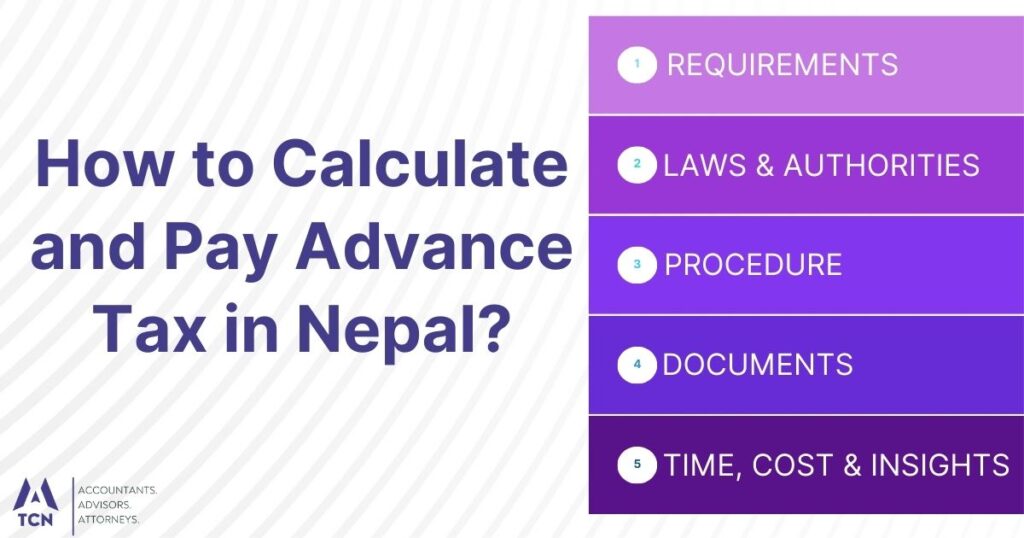Advance tax is an important aspect of Nepal’s tax system that many individuals and businesses need to understand. This article will guide you through the process of calculating and paying advance tax, helping you stay compliant with Nepalese tax laws.
Who Needs to Pay Advance Tax?
Advance tax in Nepal applies to a wide range of taxpayers. You need to pay advance tax if:
- You’re a self-employed individual with an annual income exceeding NPR 4 million
- You run a business or company
- You earn income from investments, property rentals, or other sources
- You’re a non-resident earning income in Nepal
It’s important to note that salaried employees typically don’t need to pay advance tax, as their employers deduct tax at source (TDS) from their salaries.
How is Advance Tax Calculated in Nepal?
Calculating advance tax in Nepal involves estimating your annual income and tax liability. Here’s a simplified breakdown:
- Estimate your total taxable income for the year
- Calculate the tax on this estimated income using current tax rates
- Subtract any tax deducted at source (TDS) or tax credits
- The remaining amount is your advance tax liability
Remember, this calculation is based on estimates, so it’s crucial to make realistic projections of your income to avoid underpayment or overpayment.
What are the Due Dates for Advance Tax?
In Nepal, advance tax is paid in three installments throughout the fiscal year. The due dates are:
- First installment: By Poush 15 (usually falls in late December)
- Second installment: By Chaitra 15 (usually falls in late March)
- Third installment: By Ashad 15 (usually falls in late June)
Each installment is typically 40%, 30%, and 30% of the total estimated tax liability, respectively. Mark these dates on your calendar to ensure timely payments and avoid penalties.
How to Pay Advance Tax in Nepal
Paying advance tax in Nepal is a straightforward process. Follow these steps:
- Calculate your estimated tax liability for the year
- Determine the amount for each installment
- Obtain the necessary payment forms from your local tax office or the Inland Revenue Department website
- Fill out the forms accurately, including your PAN (Permanent Account Number)
- Make the payment at an authorized bank or through online banking if available
- Keep the payment receipts safe for your records and future tax filings
Always double-check your calculations and payment details to avoid errors that could lead to complications later.
What Happens if Advance Tax is Underpaid?
Underpaying your advance tax in Nepal can have consequences. If your total advance tax payments are less than 90% of your actual tax liability for the year, you may face:
- Interest charges on the underpaid amount
- Potential penalties for non-compliance
- Increased scrutiny from tax authorities
To avoid these issues, it’s best to estimate your income conservatively and make timely payments. If your income increases unexpectedly during the year, you can always make additional payments to cover the difference.
Can Advance Tax Payments be Adjusted Later?
Yes, advance tax payments in Nepal can be adjusted when you file your final tax return for the year. Here’s what you need to know:
- If you’ve overpaid, you can claim a refund or carry forward the excess to the next year
- If you’ve underpaid, you’ll need to pay the remaining balance when filing your return
- Any adjustments will be reflected in your final tax assessment
Keep detailed records of your advance tax payments to make this process smoother when filing your annual tax return.
Relevant Articles:
- How to Calculate and Pay Advance Tax in Nepal
- How to Apply for Tax Refund in Nepal
- How to Amend Your Income Tax Return
Is There a Penalty for Late Advance Tax?
Failing to pay advance tax on time in Nepal can result in penalties. The consequences may include:
- Interest charges on the unpaid amount
- Fines for non-compliance
- Potential legal action in severe cases of repeated non-payment
To avoid these penalties, set reminders for payment due dates and ensure you have sufficient funds available to make timely payments.
How to Calculate Advance Tax for Businesses
Calculating advance tax for businesses in Nepal involves a few additional steps:
- Estimate your business’s annual turnover
- Project your expenses and deductions
- Calculate your estimated taxable profit
- Apply the appropriate corporate tax rate (currently 25% for most businesses)
- Subtract any applicable tax credits or TDS
- Divide the resulting amount into the three installments
For more complex business structures or industries with special tax provisions, consider consulting a tax professional to ensure accurate calculations.
What Income Sources Require Advance Tax Payment?
In Nepal, various income sources may require advance tax payments:
- Business income
- Professional or consulting fees
- Rental income from properties
- Investment income (dividends, interest, capital gains)
- Income from intellectual property rights
- Foreign-sourced income for residents
It’s important to consider all your income sources when calculating your advance tax liability to ensure compliance with Nepalese tax laws.
How to Report Advance Tax Payments
Reporting your advance tax payments in Nepal is crucial for proper tax accounting. Here’s how to do it:
- Keep all payment receipts and records organized
- Include details of your advance tax payments in your annual income tax return
- Provide a breakdown of each installment paid
- Reconcile your payments with your actual tax liability for the year
- Highlight any discrepancies or adjustments needed
Accurate reporting helps streamline your tax filing process and demonstrates your compliance with tax regulations to the authorities.
By understanding and following these guidelines for calculating and paying advance tax in Nepal, you can ensure compliance with tax laws and avoid unnecessary penalties or complications. Remember to stay informed about any changes in tax regulations and seek professional advice if you’re unsure about any aspect of your tax obligations.


